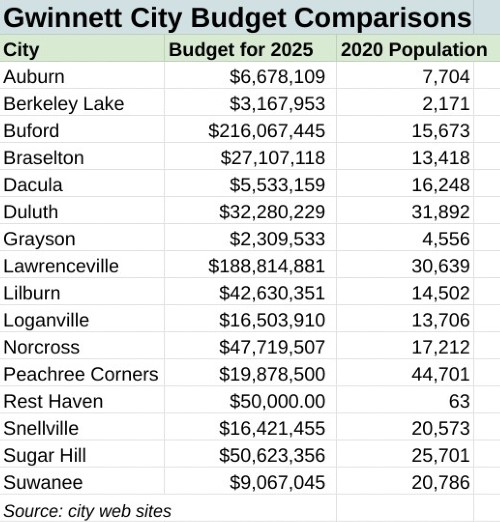By Elliott Brack
Editor and Publisher, GwinnettForum
FEB. 7, 2025 | After our recent article on how Peachtree Corners, and eventually, the new city of Mulberry, fund day-to-day operations with no property taxes, it’s time to look how much money the other cities of the county collect to fund their government.
![]() All of the other cities have a property tax, except Rest Haven. But property taxes make up only a portion of their income, as all cities get funding from franchise fees, SPLOST income, stormwater taxes, other sources of revenue and for some, from running utility operations. (Rest Haven’s small income comes principally from fees and SPLOST revenue.)
All of the other cities have a property tax, except Rest Haven. But property taxes make up only a portion of their income, as all cities get funding from franchise fees, SPLOST income, stormwater taxes, other sources of revenue and for some, from running utility operations. (Rest Haven’s small income comes principally from fees and SPLOST revenue.)
Take a look at the accompanying table to see how much income each of the Gwinnett cities have for their 2025 budget. Not included in the table is funding from the City of Mulberry, since that new city is still working on their projected budget for 2025.
 For 2025, the City of Buford has the largest budget of the Gwinnett cities, at $216 million dollars. While Buford has no property tax for operations of the city, its entire property tax income goes to its Buford City School system. Last year the city’s operational income totaled $111 million, all for its five city schools and its 5,847 students.
For 2025, the City of Buford has the largest budget of the Gwinnett cities, at $216 million dollars. While Buford has no property tax for operations of the city, its entire property tax income goes to its Buford City School system. Last year the city’s operational income totaled $111 million, all for its five city schools and its 5,847 students.
So where does the balance of Buford’s $216 million budget come from? Primarily from its “enterprise” (think utility) funds. The biggest chunk of the $104 million income from these operations is the extensive natural gas distribution service. Buford-operated gas transmission lines extend 42 miles eastward into the city of Monroe, providing a tidy profit to help fund Buford’s daily operations. Other Buford enterprise activity bringing in big income include its electrical distribution ($28 million) and its sanitation department ($10.5 million).
Lawrenceville has the second largest city budget for 2025, at $189 million. Ad valorem taxes amount to only $4,025,649. Lawrenceville also has enterprise funds, similar to Buford. Its gas sales for 2025 are anticipated at $56 million. Its enterprise fund for electrical distribution, anticipates $41 million for $2025. These two funds bring in about half the city’s total revenue..
A major cost for some cities is for police protection of its citizens. Nine of the Gwinnett cities operate their own police departments, which get a large portion of the budget. These cities are Auburn, Braselton, Duluth, Lawrenceville, Lilburn, Norcross, Snellville and Suwanee. (The Gwinnett County Police Department provides protective services for the other Gwinnett cities and the bulk of the county.) As an example of the cost for one city’s policing, the City of Norcross is budgeting $9.8 million for 2025.
Other large budgets for cities are in Sugar Hill with a budget of $50 million (which operates its own golf course as an enterprise fund); Norcross, at $47.7 million; and Duluth, with a budget for 2025 at $32.3 million.
In Rest Haven, the $50,000 that this small city anticipates is primarily from its portion of the SPLOST monies, which varies according to how well the economy is doing.
Another interesting figure is the monies that the town of Braselton gets from its Visitors Bureau, totaling $3.5 million, from its hotel-motel taxes. There are eight such establishments within its borders. Braselton benefits by having Chateau Elan nearby.
- Have a comment? Click here to send an email.









Follow Us